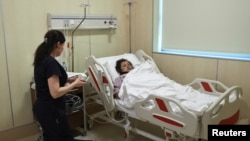Russian President Vladimir Putin Saturday apologized to his Azerbaijani counterpart for what he called a “tragic incident” following the crash of an Azerbaijani airliner in Kazakhstan that killed 38 people.
The Kremlin said in a statement that air defense systems were firing near Grozny, the regional capital of the Russian republic of Chechnya, due to a Ukrainian drone strike as the plane attempted to land Wednesday. It stopped short of saying the plane was shot down by Russian air defenses.
According to a Kremlin readout of the call, Putin apologized to Azerbaijani President Ilham Aliyev “for the fact that the tragic incident occurred in Russian airspace.”
The plane was flying from Azerbaijan’s capital of Baku to Grozny when it turned toward Kazakhstan and crashed while trying to land. There were 29 survivors.
On Friday, a U.S. official and an Azerbaijani minister made separate statements blaming the crash on an external weapon.
Friday’s assessments by Rashan Nabiyev and White House national security spokesperson John Kirby echoed those made by outside aviation experts who blamed the crash on Russian air defense systems responding to a Ukrainian attack. Neither Kirby nor the Azerbaijani minister directly addressed the statements blaming air defenses.
Kirby told reporters Friday that the U.S. has “seen some early indications that would certainly point to the possibility that this jet was brought down by Russian air defense systems,” but he refused to elaborate, citing an ongoing investigation.
Nabiyev, Azerbaijan’s minister of digital development and transportation, told Azerbaijani media that “preliminary conclusions by experts point to external impact,” as does witness testimony.
Passengers and crew who survived the crash told Azerbaijani media that they heard loud noises on the aircraft as it was circling over Grozny.
Dmitry Yadrov, head of Russia’s civil aviation authority Rosaviatsia, said Friday that as the plane was preparing to land in Grozny in deep fog, Ukrainian drones were targeting the city, prompting authorities to close the area to air traffic.
Yadrov said that after the captain made two unsuccessful attempts to land, he was offered other airports but decided to fly to Aktau in Kazakhstan, across the Caspian Sea.
He didn’t comment on statements from some aviation experts who pointed out that holes seen in the plane’s tail section suggested that it could have come under fire from Russian air defense systems.
Earlier this week, Rosaviatsia cited unspecified early evidence as showing that the pilots diverted to Aktau after a bird strike led to an emergency on board.
In the days following the crash, Azerbaijan Airlines blamed “physical and technical interference” and announced the suspension of flights to several Russian airports. It didn’t say where the interference came from or provide any further details.





